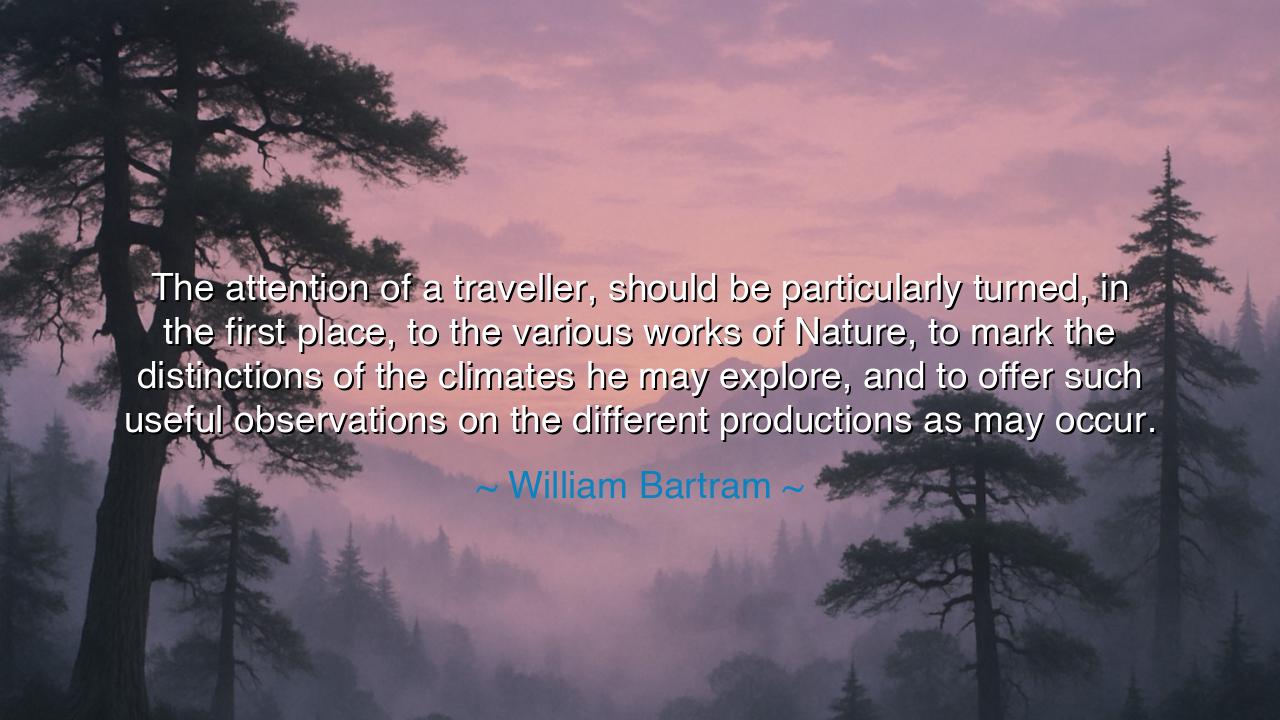
The attention of a traveller, should be particularly turned, in
The attention of a traveller, should be particularly turned, in the first place, to the various works of Nature, to mark the distinctions of the climates he may explore, and to offer such useful observations on the different productions as may occur.






Hear, O seeker of wisdom, the words of William Bartram, who proclaimed: “The attention of a traveller, should be particularly turned, in the first place, to the various works of Nature, to mark the distinctions of the climates he may explore, and to offer such useful observations on the different productions as may occur.” These words, born of the eighteenth century, come from one who wandered the wild lands of America, recording with devotion the flowers, rivers, birds, and forests that others passed by unseen. His counsel is clear: the first duty of the true traveller is not to marvel at man’s buildings or to seek only pleasure, but to behold the world of Nature with reverence, to study it, and to learn from it.
For the ancients knew well that Nature is the first teacher, older than any book, deeper than any library. The traveller who turns his gaze only to the works of men sees but a small fragment of the whole; but the one who watches the rivers, the mountains, the forests, and the skies learns the eternal language. To note the changes of climate, to understand why the olive thrives in one land and the pine in another, is to see the order of the universe and the wisdom of the Creator. Bartram’s words are not the musings of idle curiosity, but the call of a prophet: attend to Nature, for in her works are hidden the foundations of all knowledge.
Consider the journeys of Alexander von Humboldt, who centuries later followed Bartram’s spirit into South America. He climbed mountains, mapped rivers, studied the stars above the Andes, and measured the heat of tropical soils. His reports transformed Europe’s understanding of geography and biology, and laid the very groundwork for Darwin. Had Humboldt sought only gold or glory, he might have returned with nothing but empty tales. But because his attention was turned to Nature’s productions, the world gained treasures of knowledge beyond measure.
Bartram himself, wandering the wilderness of Florida, Georgia, and the Carolinas, beheld scenes few Europeans had ever witnessed. He described forests of magnolia and cypress, fields of wildflowers, and the songs of unfamiliar birds. He recorded the habits of animals and the richness of soils. His writings opened the eyes of the world to the abundance of the American continent, and they remain as vivid today as when first written. His journeys embodied the very truth of his saying: that the traveller’s task is not idle wandering, but holy observation.
O listener, take this lesson to heart: when you journey, whether to distant lands or to the forest outside your home, turn first to Nature. Do not hurry past the tree by the roadside, nor the bird that sings above you. Ask yourself what the climate teaches, what the soil produces, what life thrives there and why. Do not let your eyes be blinded by the glitter of human commerce alone, for all such works depend, in the end, on the gifts of earth and sky.
The teaching is also practical: to observe is to serve. When you note the abundance of one land, you may bring back seeds, methods, and wisdom to your own. When you see scarcity or destruction, you may carry warnings and counsel to preserve. The traveller’s observations become not only personal lessons but offerings to the greater community, for knowledge of the earth sustains the generations.
Thus, I say to you: heed the call of William Bartram. Let your attention be noble, your eyes unclouded, your heart attuned to the voice of Nature. For in every flower is a mystery, in every climate a teaching, in every land a revelation. The wise traveller does not pass through the world unchanged, but gathers from it truths as precious as jewels—and offers them back to his people as gifts of life and light.






AAdministratorAdministrator
Welcome, honored guests. Please leave a comment, we will respond soon